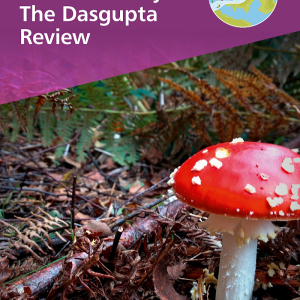
The UK Government has published the final report of the Independent Review on the Economics of Biodiversity, led by Professor Sir Partha Dasgupta of the University of Cambridge. The review sets out a new framework for how we should account for nature in economics and policy.
The report argues that human wellbeing is fundamentally dependent on nature, which itself depends on biodiversity. While human prosperity has increased dramatically in recent decades, we are now using resources that would need 1.6 Earths to be replenished, endangering the wellbeing of both current and future generations and risking triggering ecological “tipping points”.
The report identifies the cause of our unsustainable use of nature’s resources as “deep-rooted, widespread institutional failure” - specifically, the fact that nature’s value to society is not reflected in market prices; the fact that our impacts on nature are hard to measure and trace; and the fact that governments often subsidise harmful activities.
The solutions, according to the report, flow from an understanding that our economies are embedded within nature. A new economic mindset should be built around three broad transitions:
- Make sure that our resource use does not exceed nature’s supply, and increase nature’s supply by conserving and restoring natural assets. Food is identified as the most important cause of land-based biodiversity loss.
- Change our measures of economic success, by limiting use of GDP to short-term macroeconomic analysis and incorporating natural capital into national accounting systems.
- Transform institutions to support these changes, particularly finance and education.
The report concludes:
“The success stories from around the world highlighted throughout the Review show us what is possible. They also demonstrate that the same ingenuity that has led us to make demands on Nature that are so large, so damaging and over such a short period, can be redeployed to bring about transformative change, perhaps even in just as short a time. We and our descendants deserve nothing less.”
Coverage and reactions include:
- Introducing the report at the Royal Society’s launch event, Prime Minister Boris Johnson said the report is “...a body of work that I’m sure the world will come back to time and again as we engage in the vital work of protecting, restoring and improving biodiversity.”
- Caroline Lucas of the Green Party said: “Sadly just last week, Govt rejected my amendment to #EnvironmentBill to replace GDP, claiming: "economic objectives & decision-making processes are already aligned with ambitious commitments to ...improving natural environment"”
- Kate Raworth, author of Doughnut Economics, said: “The #DasguptaReview on 'The Economics of Biodiversity' is out - and it deepens The Monoculture of Economics.” (source) and “David Attenborough at launch of #DasguptaReview just said that economists understand the importance of biodiversity better than ecologists do - & can help explain it to them with financial portfolios. That is galling & absurd. Who wrote his script?” (source)
- Environmentalist and writer George Monbiot said: “What Sir Partha Dasgupta promotes is a kind of totalitarian capitalism: everything must now be commodified and brought within the system. It extends the capitalist revolution even into our relations with the living world.”
- Christiana Figueres, former Executive Secretary of the UN Framework Convention on Climate Change, said: “'Nature is our home': The Dasgupta Review makes it clear that it is less costly to conserve nature than to restore it and provides the economic rationale for protecting 30% of the planet by 2030”
- The Guardian: Economics' failure over destruction of nature presents ‘extreme risks’
- BBC News: Prosperity comes at 'devastating' cost to nature
- A collection of reactions can be found on the report’s launch page.
Read the full report, The Economics of Biodiversity: The Dasgupta Review, here. The report page also provides an abridged version and headline messages. See also the Table explainer Food systems and contributions to other environmental problems.







Post a new comment »
https://www.tandfonline.com/doi/full/10.1080/14747731.2021.1929007
The Dasgupta Review deconstructed: an exposé of biodiversity economics